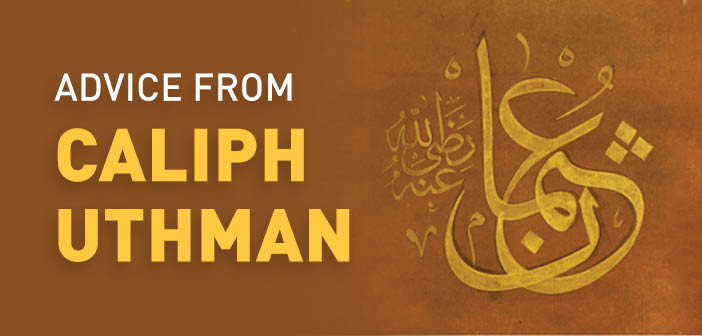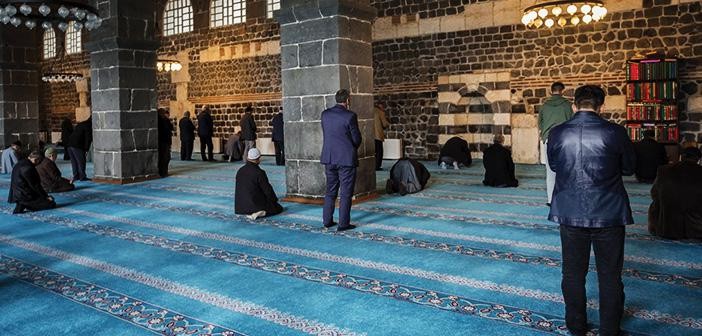
THE IMPORTANCE OF METHOD IN TEACHING IN ISLAM
The importance of method in invitation in Islam...
Invitation in this sense, or tabligh, is the attempt to summon people to live by the principles of Islam, by virtue of explaining them. To use a more famous definition, it is to enjoin what is right and forbid what is wrong. In the Quran, the Almighty imposes tabligh as a duty for all Muslims:
وَلْتَكُن مِّنكُمْ أُمَّةٌ يَدْعُونَ إِلَى الْخَيْرِ وَيَأْمُرُونَ بِالْمَعْرُوفِ وَيَنْهَوْنَ عَنِ الْمُنكَرِ وَأُوْلَـئِكَ هُمُ الْمُفْلِحُونَ
“And from among you there should be a party who invite to good and enjoin what is right and forbid the wrong, and it is these that shall be successful.” (Al-i Imran, 104)
كُنتُمْ خَيْرَ أُمَّةٍ أُخْرِجَتْ لِلنَّاسِ تَأْمُرُونَ بِالْمَعْرُوفِ وَتَنْهَوْنَ عَنِ الْمُنكَرِ
“You are the best of the nations raised up for the benefit of men; you enjoin what is right and forbid the wrong…” (Al-i Imran, 110)
The importance of tabligh is also underlined by the Prophet -upon him blessings and peace- in the following hadith:
“May Allah grace him who hears a word from us and communicates it exactly to others. Many a person, who receives a word, understands and applies it better than the actual speaker.” (Tirmidhi, Ilm, 7)
“By Allah, for a single person to receive guidance from Allah through you, is better for you than to own a valley full of red camels.” (i.e. the best of worldly goods) (Bukhari, Ashabu’n-Nabi, 9)
“The reward of an inviter is as much as that of those who follow him, without reducing theirs in any way.” (Muslim, Ilm, 16)
Anas –Allah be well-pleased with him-, a companion of the Prophet -upon him blessings and peace-, narrates the following hadith about the high ranks awaiting the inviters to Islam in the Hereafter:
“One day, the Messenger of Allah -upon him blessings and peace- explained:
‘Should I inform you of certain people? They are neither prophets nor martyrs; yet prophets and martyrs will gaze at their ranks with envy on the Day of Judgment.[1] They will be seated on pulpits of light, recognized by everyone.’
‘Who are they, the Messenger of Allah?’ the Companions asked.
The Prophet -upon him blessings and peace- answered:
‘They are those who endear people to Allah and endear Allah to people. They roam the Earth as advisors and inviters.’
Then I asked:
‘We understand how Allah may be endeared to his servants, Messenger of Allah, but how are his slaves to be endeared to Allah?’
‘They enjoin the things Allah likes and caution against the things He dislikes. And once people obey, Allah likes them”, he explained. (Ali al-Muttaqi, III, 685-686; Bayhaqi, Shuabu’l-Iman, I, 367)
While the gain of a person who duly carries out the duty of invitation is greater than the world’s richest treasures, the neglect of this duty carries consequences so grave that they could steer society to destruction.
The Blessed Prophet’s -upon him blessings and peace- related warning merits attention:
“I swear by Allah who has given me life that, either you will enjoin the good and forbid the wrong, or else Allah will send such a punishment upon you that your prayers for relief will no longer be of benefit.” (Tirmidhi, Fitan, 9)
Abza al-Huzai –Allah be well-pleased with him- narrates the following:
“One day, the Messenger of Allah ascended the pulpit to give a sermon. After speaking highly of certain groups of Muslims, he added, ‘What is the matter with some people that they do not explain matters to their neighbors, teach them what they do not know and increase understanding? Why is it that they do not enjoin the good and warn against the wrong? And what is wrong with others who do not seek to learn what they do not know from their neighbors and try to increase their understanding? ‘I swear it by Allah! Either the knowledgeable shall teach their neighbors and make them people of greater understanding, enjoin the good and forbid the wrong; and either those who do not know shall ask and learn from their neighbors and try to grasp matters of Religion, or I shall punish them both, here in this world.’
After the speech, the Prophet -upon him blessings and peace- descended the pulpit and returned home. Some remarked:
‘It could be that the Prophet -upon him blessings and peace- meant the Asharis of Yemen, as they possess understanding, while their neighbors are vulgar, hard-tempered nomads who live by oases.’
Once the Asharis were made aware of the situation, they went to the Prophet -upon him blessings and peace- and asked:
‘It seems that you spoke highly of certain people, Messenger of Allah, and badly of us. What is it about us that you spoke that way?’
The Messenger of Allah -upon him blessings and peace- kept silent, only repeating what he had said before. The Asharis were still uncertain whether they were the people in question. To completely make sense of the matter, they repeated the same question a few more times. But each time the Prophet -upon him blessings and peace- gave the same reply. Thereupon, the Asharis said:
‘Then give us one year, Messenger of Allah!’
So the Messenger of Allah allowed them a year to educate their neighbors and teach them matters of Religion, reciting the following ayah:
لُعِنَ الَّذِينَ كَفَرُوا مِنْ بَنِي إِسْرَائِيلَ عَلَى لِسَانِ دَاوُودَ وَعِيسَى ابْنِ مَرْيَمَ ذلِكَ بِمَا عَصَوْا وَكَانُوا يَعْتَدُونَ. كَانُوا لاَ يَتَنَاهَوْنَ عَنْ مُنْكَرٍ فَعَلُوهُ لَبِئْسَ مَا كَانُوا يَفْعَلُونَ
‘Cursed by the tongue of David and Jesus, son of Mary, are those who disbelieved from among the children of Israel; this was because they disobeyed and used to exceed the limit. They used not to forbid each other the hateful things which they did; certainly evil was that which they did.’ (al-Maida, 78-79) (Haythami, I, 164; Ali al-Muttaqi, III, 684/8457)
With the spiritual strength and maturity he was graced with by the Almighty, the Light of Being -upon him blessings and peace- continued preaching Islam with the desire to guide humanity entire, whereby the consciousness of fulfilling the Divine duty entrusted in him raised him to the highest level. He rejected all worldly offers that would stand in the way of carrying out his duty, valuing servanthood to the Creator above anything else.
The Prophet -upon him blessings and peace- always explained Islam according to people’s level of comprehension, to the extent of their understanding. The guidance of even a single person would give him joy beyond description. Even during an event of great magnitude like the capture of Khaybar, he took delight from lengthily explaining Islam to a slave, which ultimately led to the slave’s guidance. (Ibn Hisham, III, 398)
Again, during the harsh ten-day mission in Ta’if, the Prophet -upon him blessings and peace- led Addas, a Christian slave, to his guidance, which made him forget all the misfortunes at Ta’if.
The Messenger of Allah -upon him blessings and peace- gave his all in the way of shedding the light of Islam upon the whole of humanity, and never felt tired or fed up with the duty of invitation. Abu Rifaa –Allah be well-pleased with him- gives detail of an account that shows the Prophet’s -upon him blessings and peace- sensitivity regarding the duty of inviting:
“While the Messenger of Allah -upon him blessings and peace- was giving a sermon, I approached him and said, ‘There is a poor man, Messenger of Allah, who says he wants to learn this Religion.’
The Prophet -upon him blessings and peace- turned and looked at me. Cutting the sermon short, he then came next to me. They immediately brought him a steel legged stool on which he sat and explained me a few things he had been taught by the Almighty. He then returned and completed his sermon.’” (Muslim, Juma, 60)
The Companions were also very sensitive in communicating the truth and fixing the errors they saw. The duty of alerting those who acted against the Sunnah of the Prophet -upon him blessings and peace- was not just reserved to a few selected persons among them. Given the right time and the right place they would do what they had to do. They would express the truth regardless of its consequences as they could not tolerate anything in opposition to the Sunnah of the Prophet -upon him blessings and peace-. They would have nothing to do with those who had a habit of objecting to the hadith of the Prophet -upon him blessings and peace-, saying they could never live under the same roof.[2] To those who forwarded their own opinions in opposition to the hadiths they would say they could no longer remain with them in the same environment, immediately after which they would leave.[3]
Sufyan as-Sawri says the following on the importance of tabligh:
“It is better for you to go to Khorasan to preach Islam, than to live in Mecca.”
For a task as important as inviting people to Islam, the rearing of persons who can properly carry it out becomes equally important. The incident below clearly expresses the value of a spiritually well-trained inviter.
“Omar –Allah be well-pleased with him- was one day sitting with his friends. He asked them to make some wishes from Allah. Some wished:
‘…for a houseful of coins to spend in the cause of Allah!’
Another few wished:
‘…for a houseful of gold so to spend in the cause of Allah!’
Yet some other Companions wished:
‘…for a houseful of jewelry to use in the way of Allah!’
‘Ask for more, more!’ Omar insisted.
‘What more from Allah could we ask for?’ they inquired.
Thereupon Omar –Allah be well-pleased with him- said, ‘I would wish for this house to be filled with people of exceptional maturity of the likes of Abu Ubayda ibn Jarrah, Muaz ibn Jabal, Huzayfa’tul-Yaman, so I can employ them in ensuring obedience to Allah, in the service of enjoining good and forbidding evil…” (Bukhari, Tarikh’us-Saghir, I, 54)
The Almighty, the absolute source of mercy and compassion, explains the most effective style to follow in calling His servants to the true path:
اُدْعُ اِلَى سَبِيلِ رَبِّكَ بِالْحِكْمَةِ وَالْمَوْعِظَةِ الْحَسَنَةِ وَجَادِلْهُمْ بِالَّتِى هِىَ اَحْسَنُ
“Call to the way of your Lord with wisdom and good advice, and have disputations with them in the best manner…” (an-Nahl, 125)
وَلاَ تُجَادِلُوا اَهْلَ الْكِتَابِ اِلاَّ بِالَّتِى هِىَ اَحْسَنُ اِلاَّ الَّذِينَ ظَلَمُوا مِنْهُمْ وَقُولُوا اَمَنَّا بِالَّذِى اُنْزِلَ اِلَيْنَا وَاُنْزِلَ اِلَيْكُمْ وَاِلَهُنَا وَاِلَهُكُمْ وَاحِدٌ وَنَحْنُ لَهُ مُسْلِمُونَ
“And do not dispute with the followers of the Book except by what is best, except those of them who act unjustly, and say: We believe in that which has been revealed to us and revealed to you, and our God and your God is One, and to Him do we submit.” (al-Ankabut, 46)
وَمَنْ اَحْسَنُ قَوْلاً مِمَّنْ دَعَا اِلَى اللهِ وَعَمِلَ صَالِحًا وَقَالَ اِنَّنِى مِنَ الْمُسْلِمِينَ وَلاَ تَسْتَوِى الْحَسَنَةُ وَلاَ السَّيِّئَةُ اِدْفَعْ بِالَّتِى هِىَ اَحْسَنُ فَاِذَا الَّذِى بَيْنَكَ وَبَيْنَهُ عَدَاوَةٌ كَاَنَّهُ وَلِىٌّ حَمِيمٌ
“And who speaks better than he who calls to Allah while he himself does good, and says: I am surely one of those who submit? And not alike are the good and the evil. Repel (evil) with what is best[4]; he between whom and you was enmity would be as if he were a warm friend.” (Fussilat 33-34)
قُلْ هَـذِهِ سَبِيلِي أَدْعُو إِلَى اللّهِ عَلَى بَصِيرَةٍ أَنَاْ وَمَنِ اتَّبَعَنِي وَسُبْحَانَ اللّهِ وَمَا أَنَاْ مِنَ الْمُشْرِكِينَ
“Say: This is my way: I call to Allah, I and those who follow me being certain, and glory be to Allah, and I am not one of the idolaters.” (Yusuf, 108)
Throughout history, the appliance of the recommended Divine style of invitation has turned many thorny souls into roses, and the darkness of many hearts into light. Even when sending Musa and Harun -upon them peace- to a transgressor and deviant of the caliber of the Pharaoh, Allah, glory unto Him, still advised them to be gentle:
فَقُولَا لَهُ قَوْلًا لَّيِّنًا لَّعَلَّهُ يَتَذَكَّرُ أَوْ يَخْشَى
“…Then speak to him a gently, that perhaps he may mind or fear.” (Ta-ha, 44)
We can see in the above verse the two fundamentals of the method of invitation:
- When communicating the truth, one must use a gentle manner without provoking the person.
Even though the Pharaoh himself had in fact leaned towards believing on many occasions after having witnessed the numerous miracles of Musa -upon him peace-, he was prevented by his vizier Haman and his circle. Losing to arrogance and conceit, he chose not to believe.
By advising Musa -upon him peace- to adopt a gentle approach, the Almighty also teaches us a method of invitation. Before the actual invitation takes place, hearts are to be softened.[5] Quarrel has no place in the lives of prophets and saints; letting actions do the preaching is what is important.
As all prophets given by the Almighty the duty of invitation came to mend hearts, they always looked at others from the window of the heart and thus enabled the guidance of many by continuously spreading love and mercy in their surroundings. To do otherwise would have produced a gulf that would have completely severed ties with others and the chance of communicating the Truth to them would have been forever lost. And this would have been at odds with Divine Will, as Allah, glory unto Him, wishes His servants be saved from the swamp they are in. For this reason, the Almighty has sent thousands of prophets throughout history, commanding them to purify hearts with the most beautiful of approaches. Again in line with the same aim, saints who have been blessed among mankind have continued this prophetic manner in the spiritual training of others.
No benefit can be expected from services offered with a harsh and offensive manner which can in no way be reconciled with good morals. This is all the more important in activities that directly address the person’s soul, such as education, invitation and offering guidance. In the Prophet’s -upon him blessings and peace- person, the ayah below addresses the entire Muslims:
فَبِمَا رَحْمَةٍ مِنَ اللهِ لِنْتَ لَهُمْ وَلَوْ كُنْتَ فَظًّا غَلِيظَ الْقَلْبِ لاَنْفَضُّوا مِنْ حَوْلِكَ
“Thus it is due to mercy from Allah that you deal with them gently, and had you been rough, hard hearted, they would certainly have dispersed from around you.” (Al-i Imran, 159)
- To extend the invitation to all of humanity, regardless of their status.
A brutal and miserable man who could not lend himself to believe, the Pharaoh was at the same time a ruthless murderer who had slain thousands of innocent babies just to kill Musa, -upon him blessings and peace-. But he still became subject to Divine invitation.
Similarly, the Prophet Muhammad -upon him blessings and peace- invited Abu Jahl to Islam on numerous occasions. While accepting in his conscience the clear truth of the words of the Prophet -upon him blessings and peace-, Abu Jahl could not admit to it, defeated by his ego and conceit. But the noble manner of the Messenger of Allah led to the guidance of many who were enemies of Islam to begin with, like Omar ibn Khattab, Abu Sufyan, Hind and Wahshi.
Both in Islamic activities and all social relations in general, this approach engenders elegance, kindness and sensitivity to people’s special circumstances and physical conditions. This is the exact approach seen in its most inspirational form in the behavior of sufis.
When we look into the Blessed Prophet’s -upon him blessings and peace- twenty-three year period of invitation, we come across the following six factors that shed light on the path of an aspiring inviter.
- The Messenger of Allah -upon him blessings and peace- began the invitation with his closest relatives. After all, the Almighty had revealed:
وَأَنذِرْ عَشِيرَتَكَ الْأَقْرَبِينَ
“…And warn your nearest relations.” (as-Shuara, 214)
يَااَيُّهَا الَّذِينَ اَمَنُوا قُوا اَنْفُسَكُمْ وَاَهْلِيكُمْ نَارًا وَقُودُهَا النَّاسُ وَالْحِجَارَةُ عَلَيْهَا مَلَئِكَةٌ غِلاَظٌ شِدَادٌ لاَ يَعْصُونَ اللهَ مَا اَمَرَهُمْ وَيَفْعَلُونَ مَا يُؤْمَرُونَ
“O you who believe! Save yourselves and your families from a fire whose fuel is men and stones; over it are angels stern and strong, they do not disobey Allah in what He commands them, and do as they are commanded.” (at-Tahrim, 6)
- In inviting to Islam, the Prophet of Allah -upon him blessings and peace- observed gradualness, following an ease path that gradually increased in difficulty.
The Almighty’s first command was:
اقْرَأْ
“Read!” (al-Alaq, 1)
Then Muhammad -upon him blessings and peace- was given the duty of rophethood, whereupon he was ordered to:
قُمْ فَأَنذِرْ
“Get up and warn!” (al-Muddaththir, 2)
After that came the Divine command:
وَأَنذِرْ عَشِيرَتَكَ الْأَقْرَبِينَ
“…And warn your nearest relations.” (as-Shuara, 214)
Afterward the borders of the duty were expanded as to include the entire town:
وَمَا كَانَ رَبُّكَ مُهْلِكَ الْقُرَى حَتَّى يَبْعَثَ فِي أُمِّهَا رَسُولًا يَتْلُو عَلَيْهِمْ آيَاتِنَا وَمَا كُنَّا مُهْلِكِي الْقُرَى إِلَّا وَأَهْلُهَا ظَالِمُونَ
“And your Lord never destroyed the towns until He raised in their main town a messenger, reciting to them Our communications, and We never destroyed the towns except when their people were unjust.” (al-Qasas, 59)
The next step was the further extension of the invitation as to include neighboring regions:
وَهَـذَا كِتَابٌ أَنزَلْنَاهُ مُبَارَكٌ مُّصَدِّقُ الَّذِي بَيْنَ يَدَيْهِ وَلِتُنذِرَ أُمَّ الْقُرَى وَمَنْ حَوْلَهَا
“And this is a Book We have revealed, blessed, verifying that which is before it, and that you may warn the Mother of Towns and those around her; and those who believe in the hereafter believe in it, and they attend to their prayers constantly.” (al-Anaam, 92)
Finally, it was proclaimed that the boundaries of the invitation were as vast as those of humanity:
وَمَا اَرْسَلْنَاكَ اِلاَّ رَحْمَةً لِلْعَالَمِينَ
“And We have not sent you but as a mercy to the worlds.” (al-Anbiya, 107)
وَمَا أَرْسَلْنَاكَ إِلَّا كَافَّةً لِّلنَّاسِ بَشِيرًا وَنَذِيرًا وَلَكِنَّ أَكْثَرَ النَّاسِ لَا يَعْلَمُونَ
“And We have not sent you but to all people as a bearer of good news and as a warner, but most do not know.” (Sab’a, 28)
We see that the Noble Prophet -upon him blessings and peace- also followed the same principle of gradualness in passing on certain regulations. Many instances including the commanding of salat and fasting, and the prohibition of alcohol and usury provide fitting examples.
The Light of Being -upon him blessings and peace- who brought his companions to a perfect level of servanthood, did not bring this about through a sudden change, but rather through a slow, gradual and subtle development. This can be clearly seen for instance in the Prophet’s -upon him blessings and peace- advice to Muadh ibn Jabal –Allah be well-please with him- before sending him to Yemen:
“You are about to reach a community of the people of the Book. The very first thing to which you should call them is that there is no god but Allah, may His Glory be Magnificent, and that I am His messenger. If they accept, then instruct them that He has enjoined five salats on them during the day and the night. If they accept and obey, then instruct them that Allah has made alms obligatory for them, to be collected their wealthy and distributed to the needy. And if they accept that too, then avoid selecting the best items of their riches. Do not attract the ill wishes of the oppressed, as there stands no curtain between their prayers and Allah.” (Bukhari, Zakat 41-63; Muslim, Iman 29-31)
- To invite or educate, the Messenger of Allah -upon him blessings and peace- always looked out for a suitable opportunity in terms of time, place and the person’s state of mind.
Ibn Masud –Allah be well-pleased with him-, used to preach on Thursdays. A person once said to him, “If only you addressed us every day!”
“I do not preach everyday from the fear of boring you”, Ibn Masud –Allah be well-pleased with him- replied. “Even the Messenger of Allah -upon him blessings and peace- used to watch out for the times we were eager to listen, so that we would not get bored.”
(Bukhari, Ilm, 11, 12)
During the conquest of Mecca, Abbas –Allah be well-pleased with him- brought Abu Sufyan, who had agreed to become Muslim, and said to the Messenger of Allah -upon him blessings and peace-, “Abu Sufyan is a person who loves to be complimented, Messenger of Allah. How about you do something that would make him feel honored?”
The Prophet -upon him blessings and peace- replied, “You are right! As we enter the town, announce that ‘whoever enters the house of Abu Sufyan and whoever remains home and keeps their doors closed is safe.” (Abu Dawud, Kharaj, 24-25/3021)
To the questions that were asked to him from time to time, the Prophet -upon him blessings and peace- would respond by considering the questioner’s circumstances, and would follow methods appropriate to the person.
To the various people who inquired ‘what the most virtuous deed’ is, the Prophet -upon him blessings and peace- gave different answers depending on their circumstances.
“The most virtuous deeds are belief in Allah, struggling in His way and an accepted pilgrimage!” (Bukhari, Hajj, 4)
“It is salat performed on time!” (Bukhari, Mawaqit, 5)
“…the remembrance of Allah!” (Muwatta’, Quran, 24)
“…to love for the sake of Allah!” (Abu Dawud, Sunnah, 2)
“…Emigration!” (Nesai, Bay’ah, 14)
“…to serve one’s parents!” (Ibn Athir, Usdu’l-Ghaba, IV, 330)
- For the Noble Prophet -upon him blessings and peace-, providing ease and offering glad tidings were the basics of all affairs and he strictly abided by these principles in his calling.
It is said in a hadith:
“Provide ease, not difficulty; give glad tidings, do not drive people away.” (Bukhari, Ilm 11, Adab, 80)
Correspondingly, the Almighty states:
يُرِيدُ اللّهُ بِكُمُ الْيُسْرَ وَلاَ يُرِيدُ بِكُمُ الْعُسْرَ
“…Allah desires ease for you, and He does not desire difficulty for you.” (al-Baqara, 185)
وَرَحْمَتِي وَسِعَتْ كُلَّ شَيْءٍ
“…and My mercy encompasses all things…” (al-Araf, 156)
In what could be regarded as a commentary of the above ayah, the Prophet -upon him blessings and peace- has said:
“When Allah the Almighty created all creation, he wrote in His Book, hanging above His Throne: ‘My mercy has vanquished my anger!’” (Bukhari, Tawhid, 15, 22, 28, 55; Muslim, Tawba, 14-16)
Abu Hurayra –Allah be well-pleased with him- narrates the following incident:
“An Arab from the desert had urinated in the Masjid of Medina. The Companions immediately began rebuking him, whereupon the Prophet -upon him blessings and peace- said:
‘Leave the man alone. Just wash that place with a bucket of water after he is done. You have come to provide ease, not to cause difficulty.” (Bukhari, Wudu, 58; Adab, 80)
- An important part of the Prophet’s -upon him blessings and peace- invitation was to warn of Divine punishment and to encourage preparation for the Hereafter.
When the Gracious Prophet -upon him blessings and peace- first began his call, he addressed his kin, the children of Hashim in the following words:
“I hereby call you to bear witness that there is no god but Allah, He is One and without a partner. And I am His servant and messenger. If you accept this as it is, then I shall guarantee Paradise for you.
But on the Day of Judgment, if you do not come with good deeds and instead arrive with a world of sin on your shoulders, then I shall turn away from you! Then, you will plead, ‘O Messenger of Allah’…And I will then do ‘such and such’”.
When the Messenger of Allah said ‘I will then do such and such’, he physically turned his face away from them, repeating the action twice.” (Ibn Ishaq, p. 128; Yakubi, II, 27)
- Not only did the Prophet -upon him blessings and peace- invite people verbally, he also brought his words to life through practice, and effectively invited them also through his overall behavior.
The most effective form of inviting to Islam is by living it. The Companions of the Prophet had devoted themselves to Islam to carry the voice of belief to the most remote corners of the world and to guide humanity. Today, exhibiting the beauties of Islam to the world with the same excitement and vigor still remains the best form of invitation.
It is a duty upon all Muslims to invite others to Islam through explanation and practice, to the best of their ability. Today, the rise of resources and ways of communication means that this responsibility has increased all the more. Those who live in the most distant places of the world and thus have not even heard of Islam, and many others whose guidance we have neglected even though they are very close to us, will grab us by the scruff of our necks and call us into account in the Hereafter.
Regarding the above, Abu Hurayra –Allah be well-pleased with him- states:
“We used to hear of a man, who, on the Day of Judgment, is going to grab another by the scruff of his neck and call him into account. The other man will ask:
‘What do you want from me? I do not even know you!’
‘You used to see me on Earth committing bad deeds,’ the man will reply, ‘without ever warning me.’” (Rudani, Jam’ul-Fawaid, V, 384)
[1] Indicated by the expression is the value of those occupied with inviting others to Truth. It does not imply they have a greater worth than prophets and martyrs, for both are persons who have sacrificed their lives on the way of Truth. Their fondness of the deeds of those engaged with tabligh and their related joy, stems from their insight into the sacredness of the duty itself.
[2] See Shafiî, Risâla, p. 193, İstanbul, 1985; Suyutî, Miftâh, p. 48, Beirut 1987.
[3] See Muwatta’, Buyu’, 33; Ibn Mâjah, Muqaddima, 2.
[4] A beautiful illustration of this ayah is provided by Yusuf –upon him peace-, who, instead of holding the misdemeanors of his brothers against them, continued treating them with the same respect and honor as before. The brethren eventually identified him, and pronounced, تَاللّٰهِ لَقَدْ اٰثَرَكَ اللّٰهُ عَلَيْنَا “By Allah, He has certainly preferred you over us”, confessing Yusuf’s superiority over them, requesting to be pardoned. The incident is a clear case in point attesting to the effectiveness of calling to the right path foremost through conduct. For a detailed account see, Osman Nûri TOPBAŞ, Nebîler Silsilesi 2, p. 129-130, İstanbul, 2004.
[5] During the 7th year of Hegira, in the wake of the Capture of Khaybar, the Noble Prophet -upon him blessings and peace- aided the depleted Meccans, who were battling fierce famine and scarcity, with supplies of gold, barley and date seeds. Accepting the aid, Abu Sufyan distributed it among the Meccan needy, exclaiming at the same time appreciatively, “May Allah reward our Cousin for looking out for his relatives…” (Yaqubi, II, 56) Their hearts growing tender through such acts of magnanimity, the Meccans soon found themselves wholeheartedly and unreservedly accepting Islam.
Source: Fiqh1 (According To The Shafi’i School Of Islamic Law), Erkam Publications
SIMILAR ARTICLES
- WHAT IS ISLAM?
- THE FAMİLY TREE OF PROPHET MUHAMMAD SAW
- THE ESSENTIALS OF ISLAMIC FAITH
- FREE İSLAMİC BOOKS READ AND DOWNLOAD PDF
- MORALITY IN ISLAM














